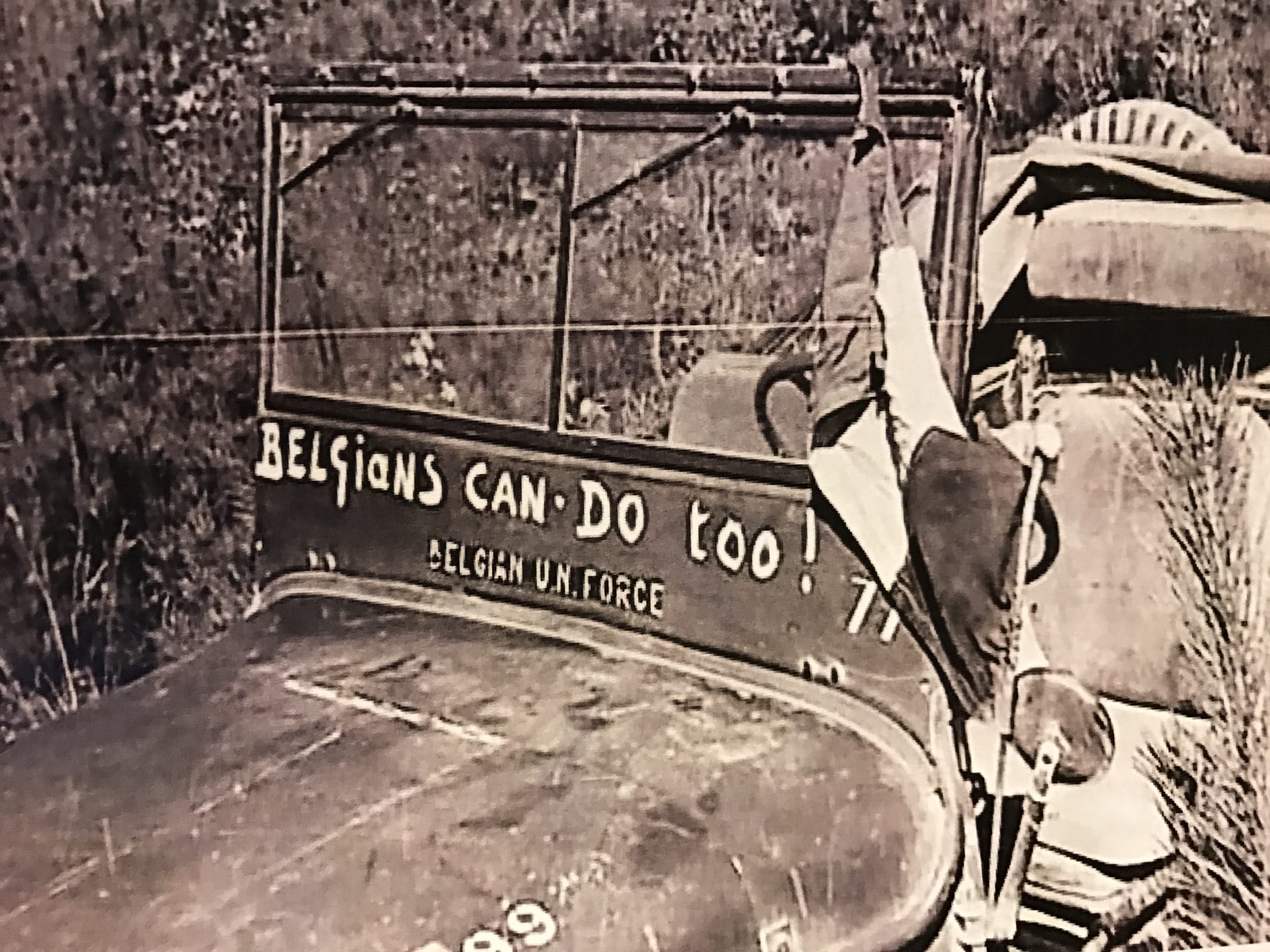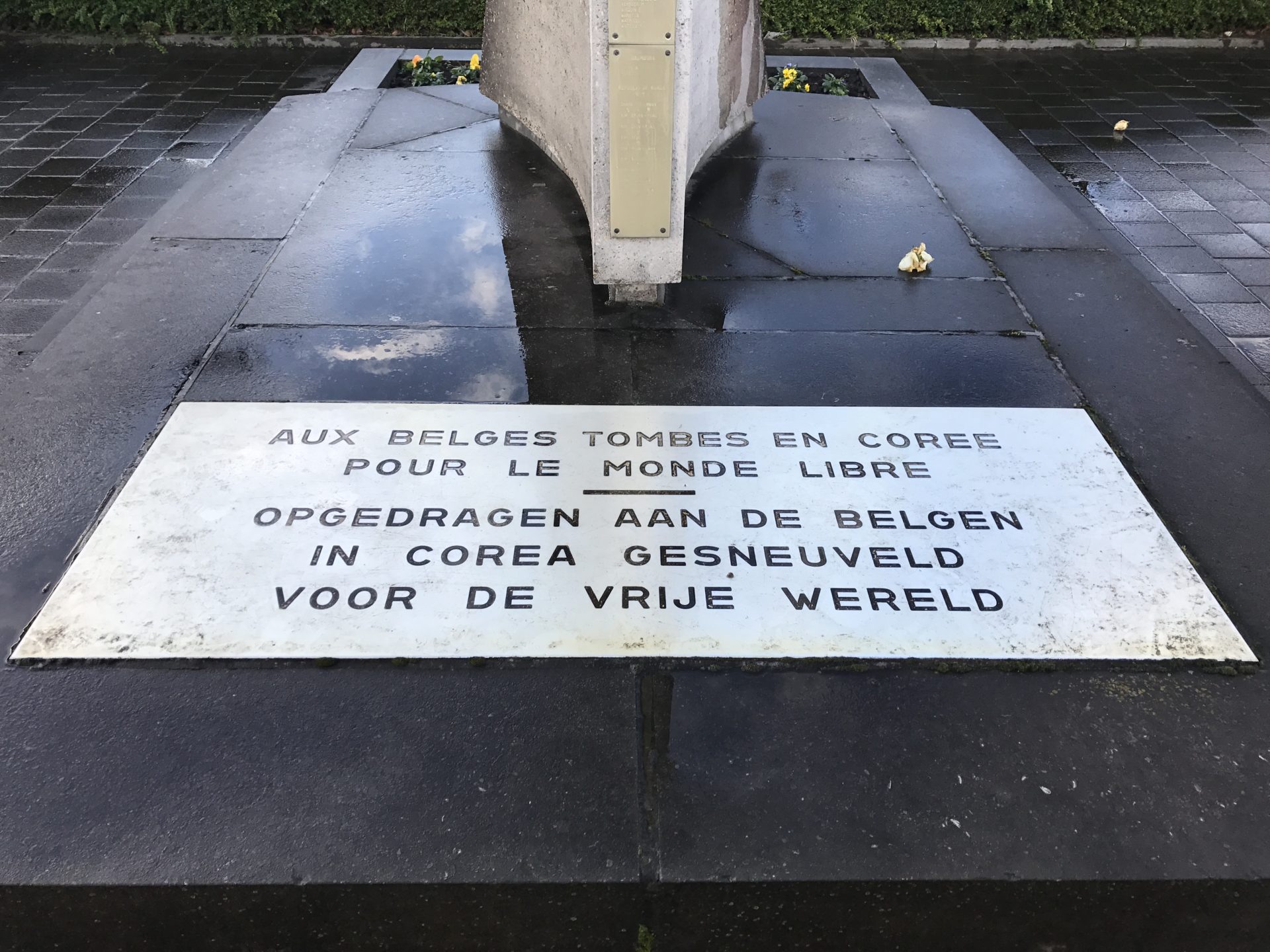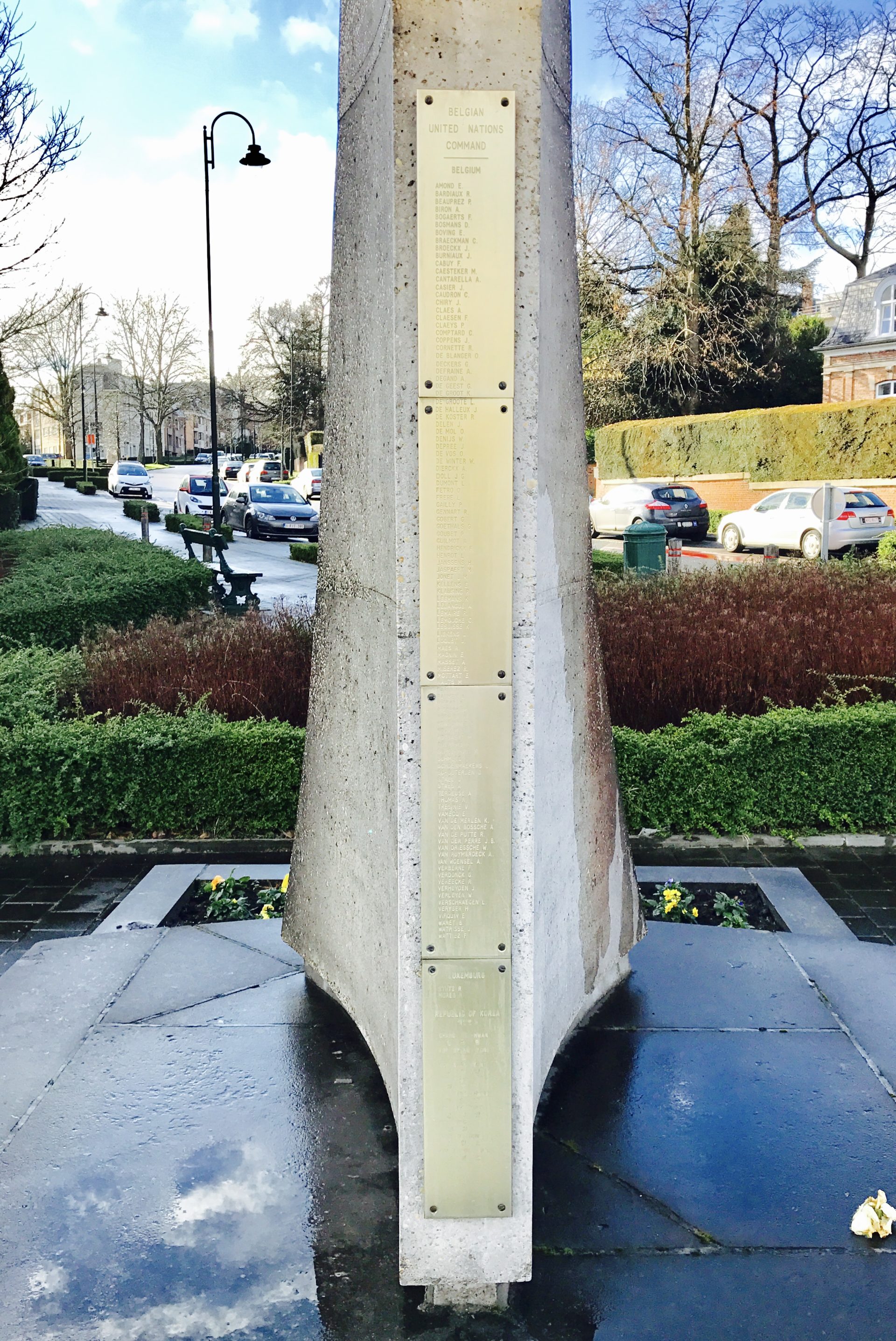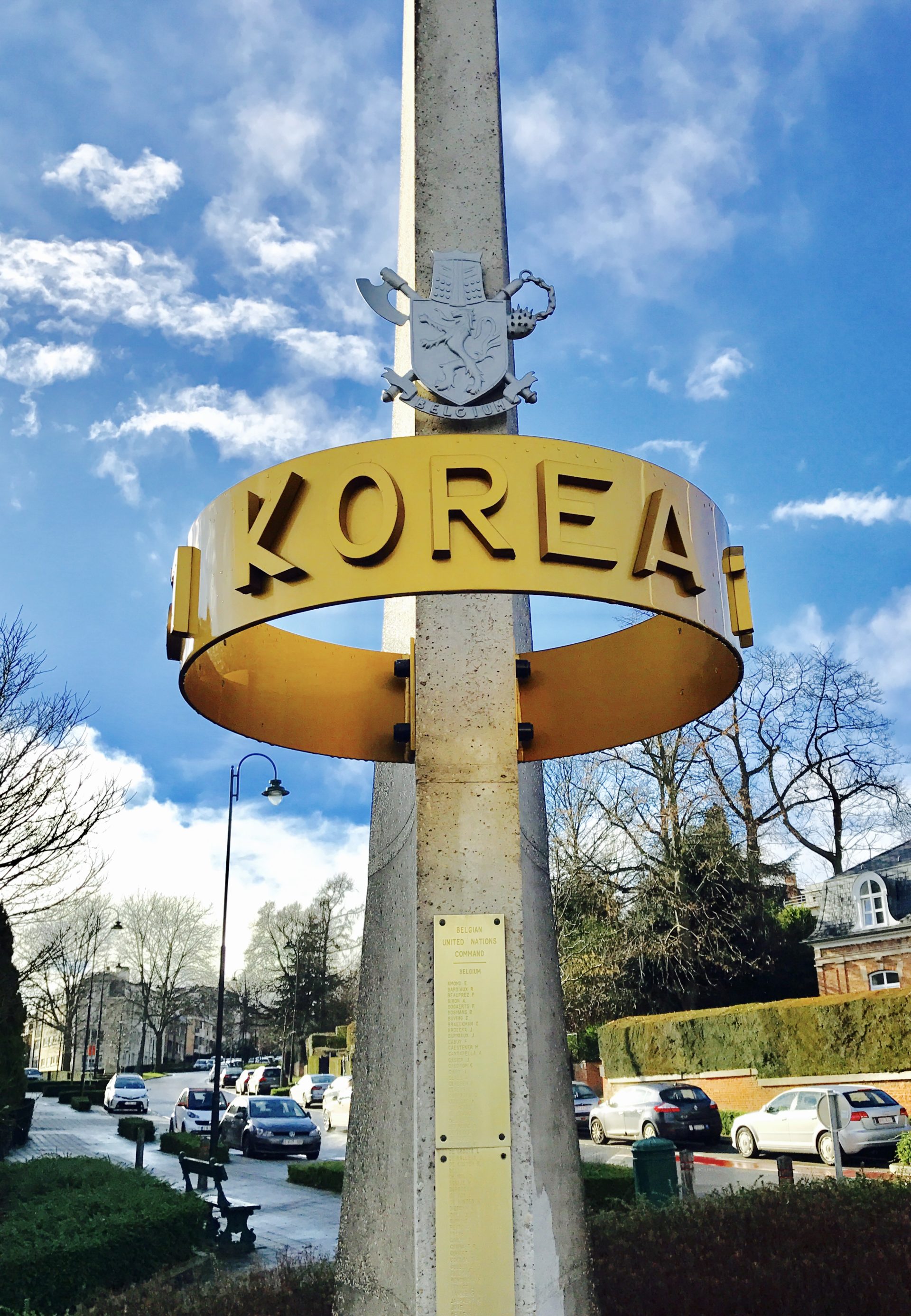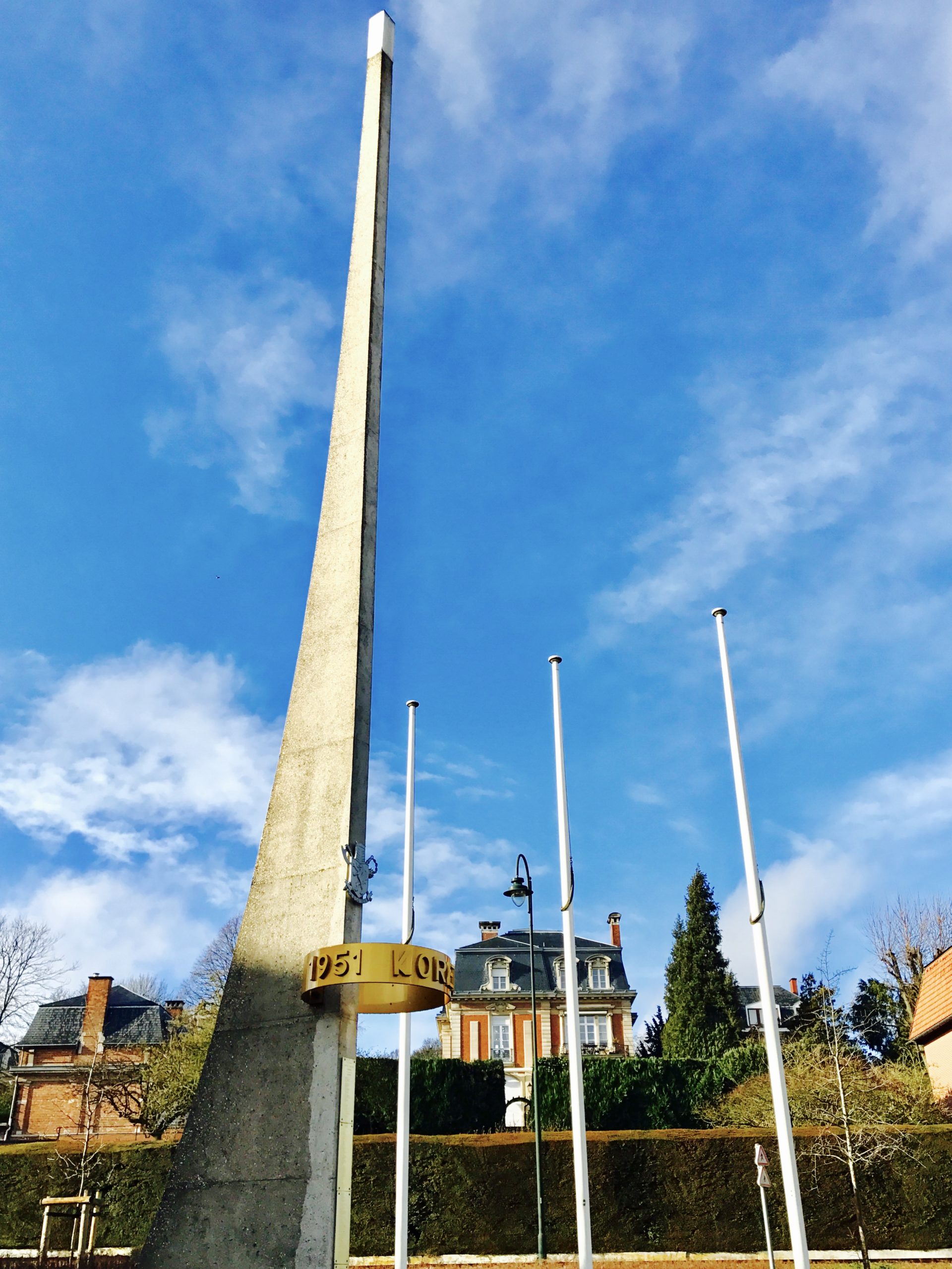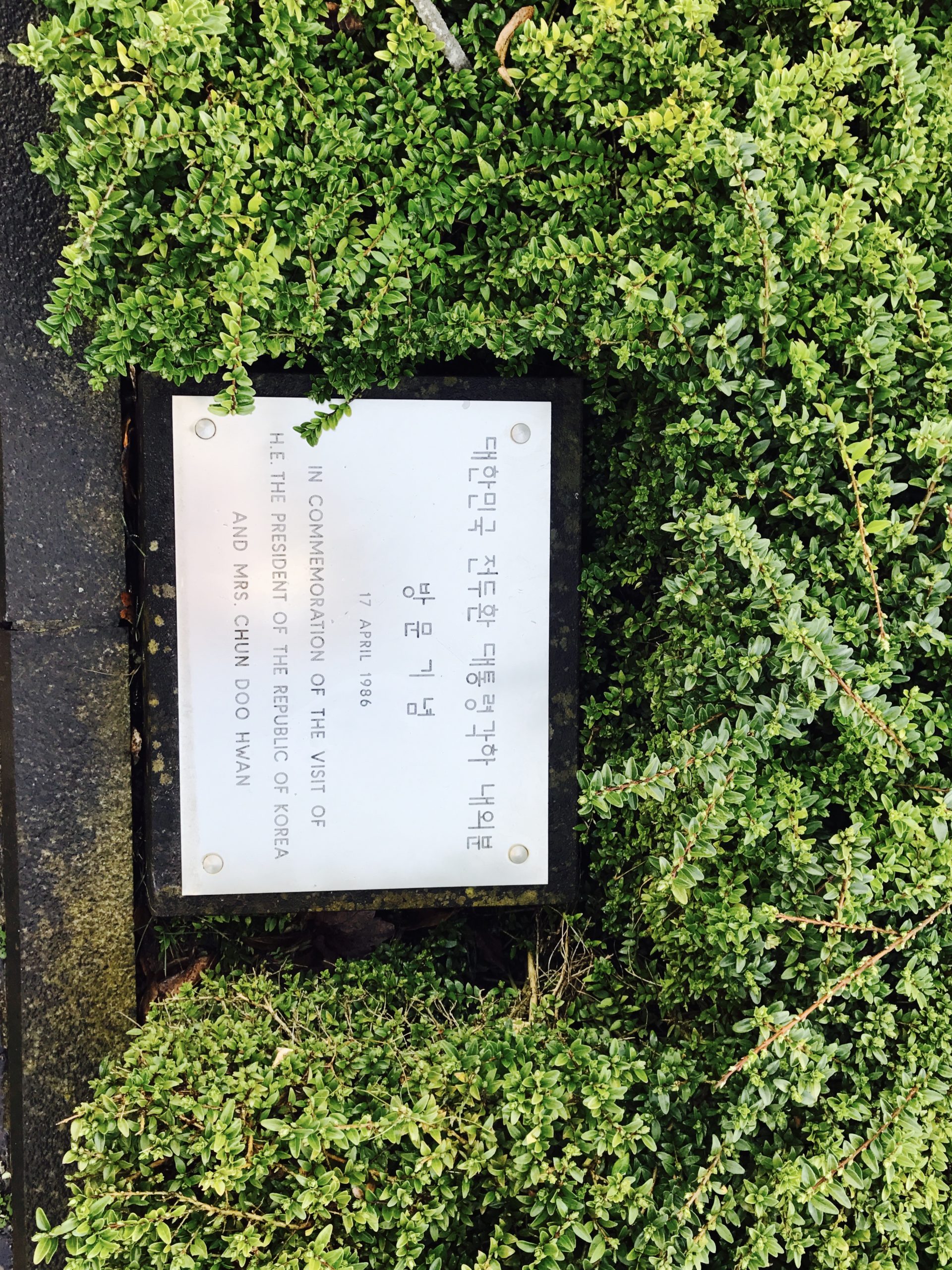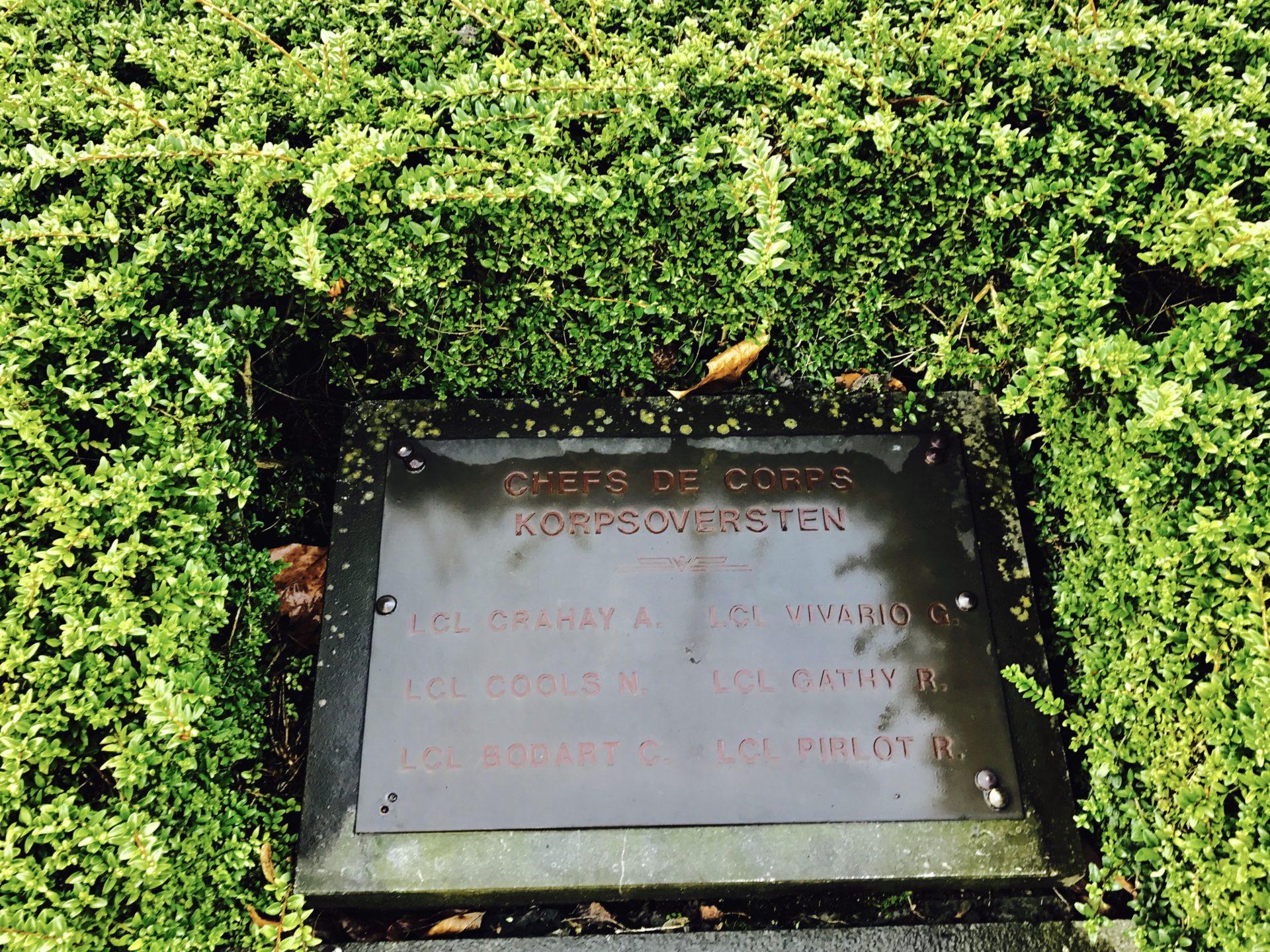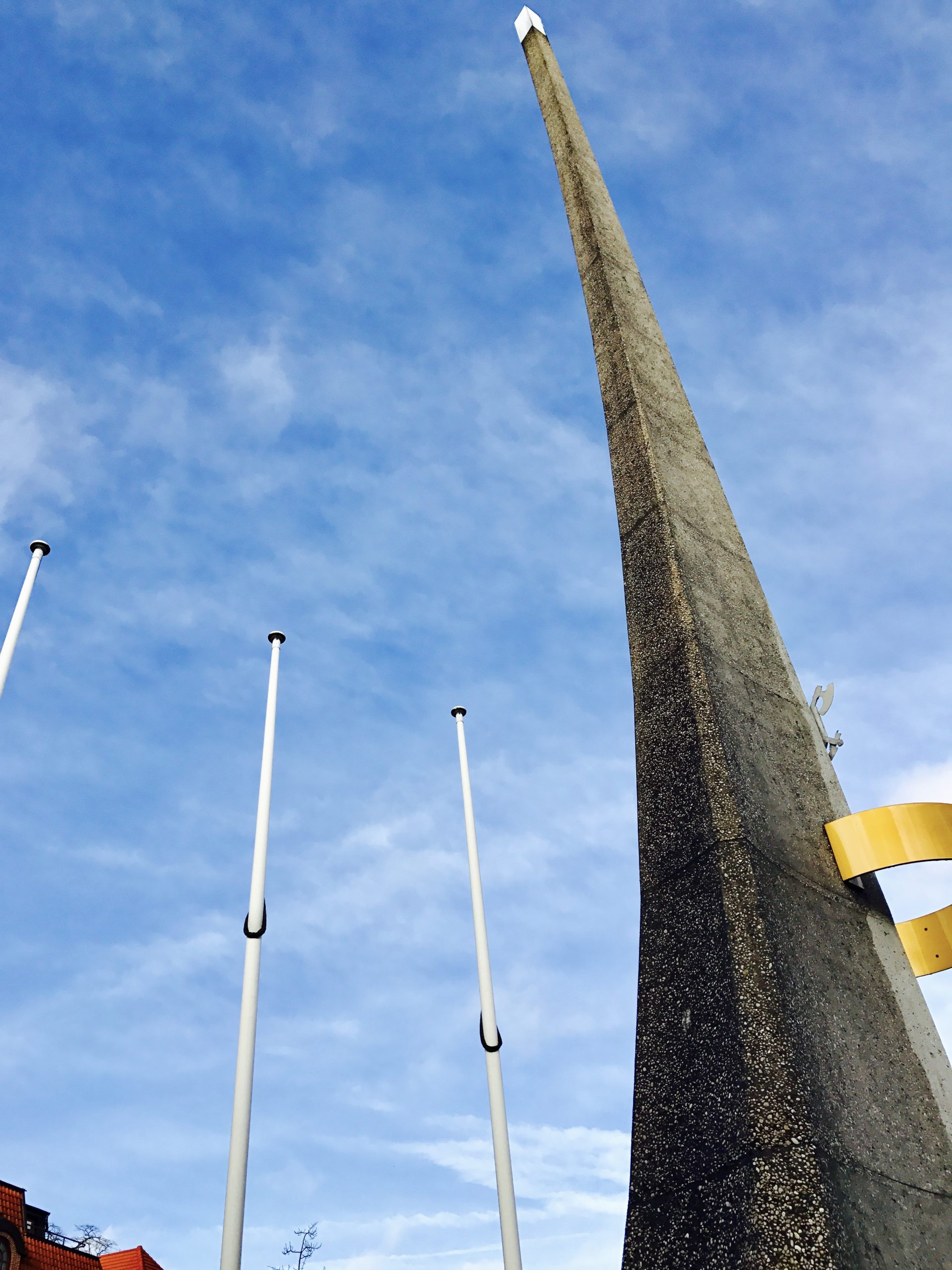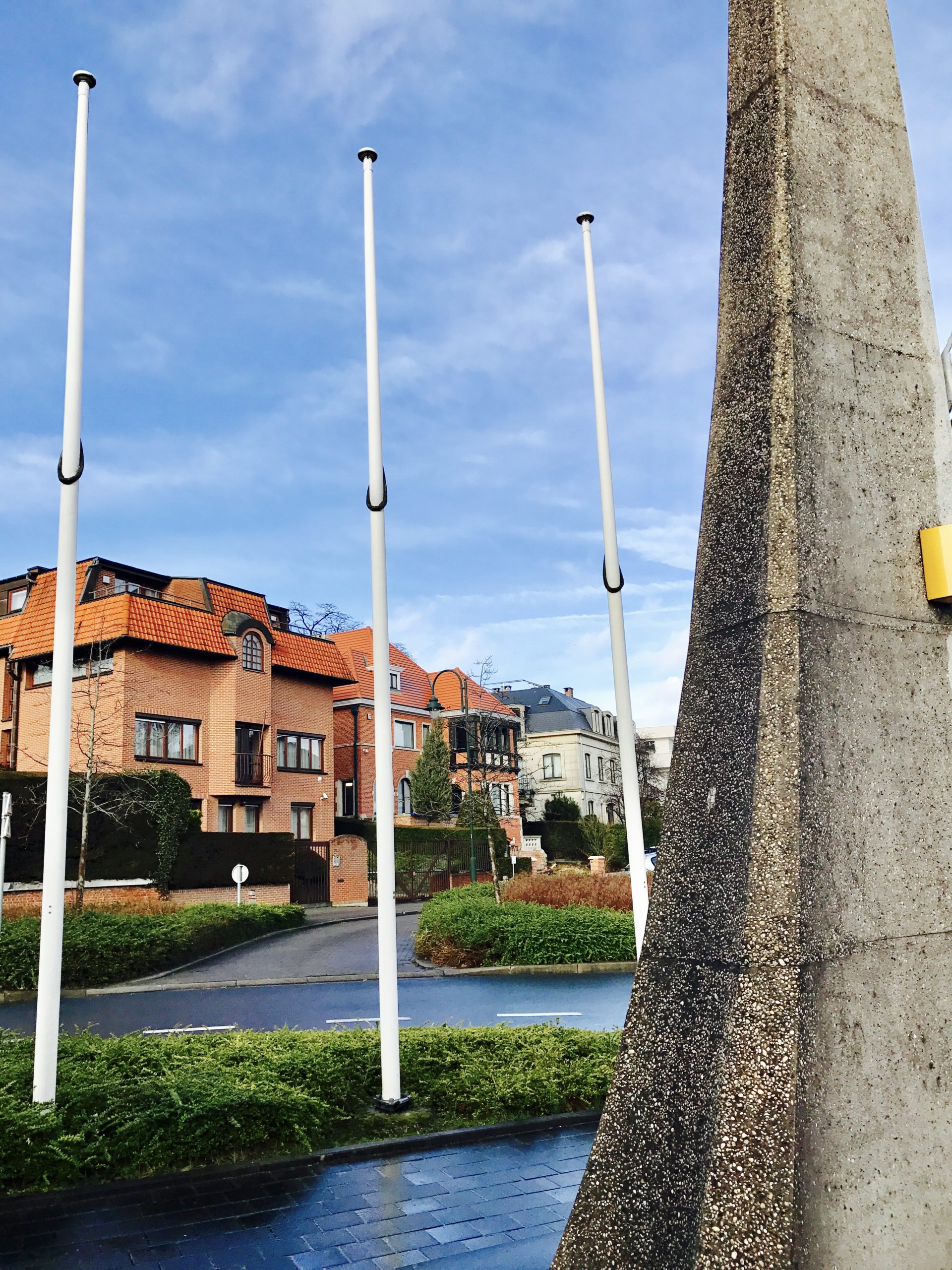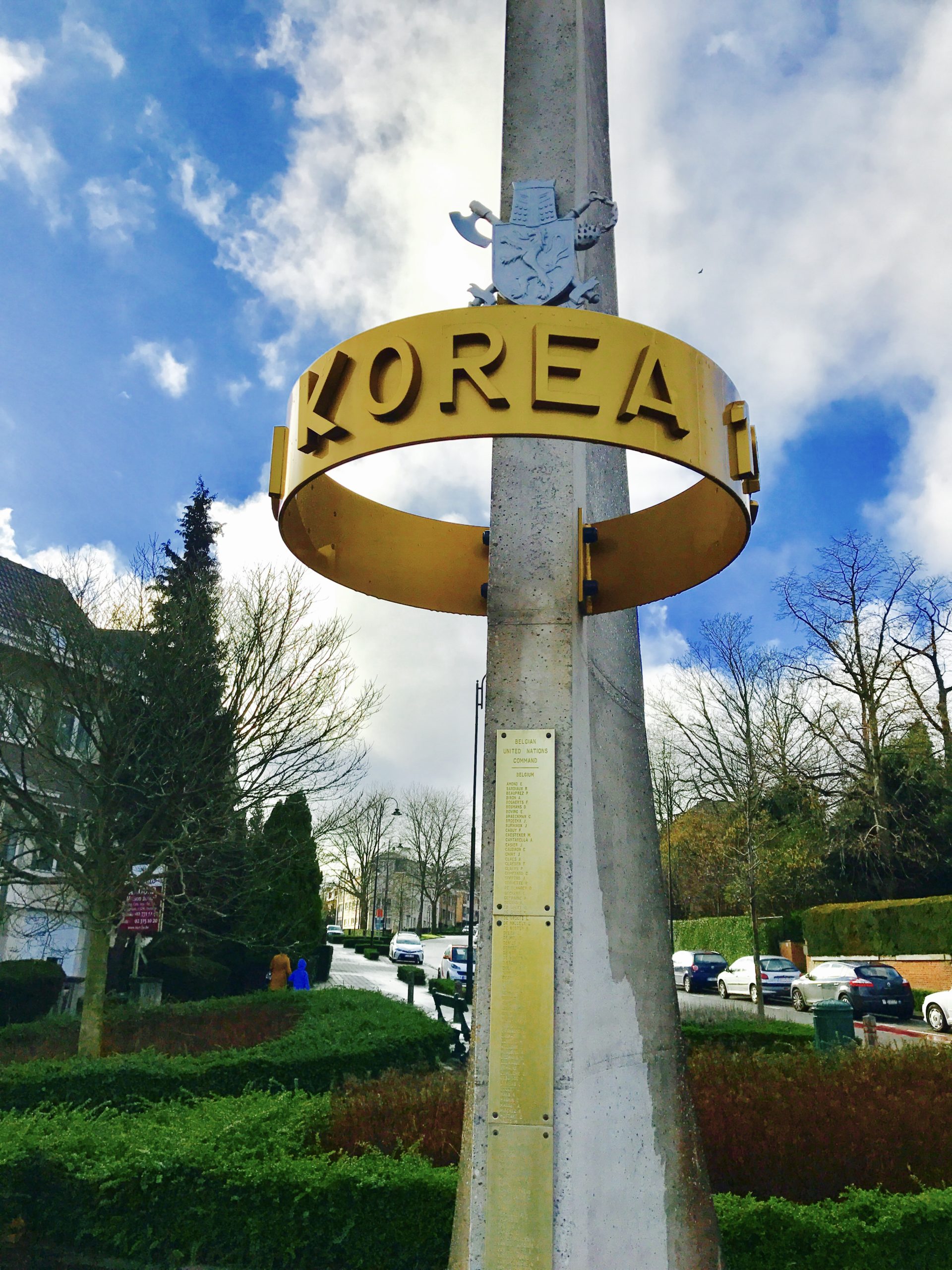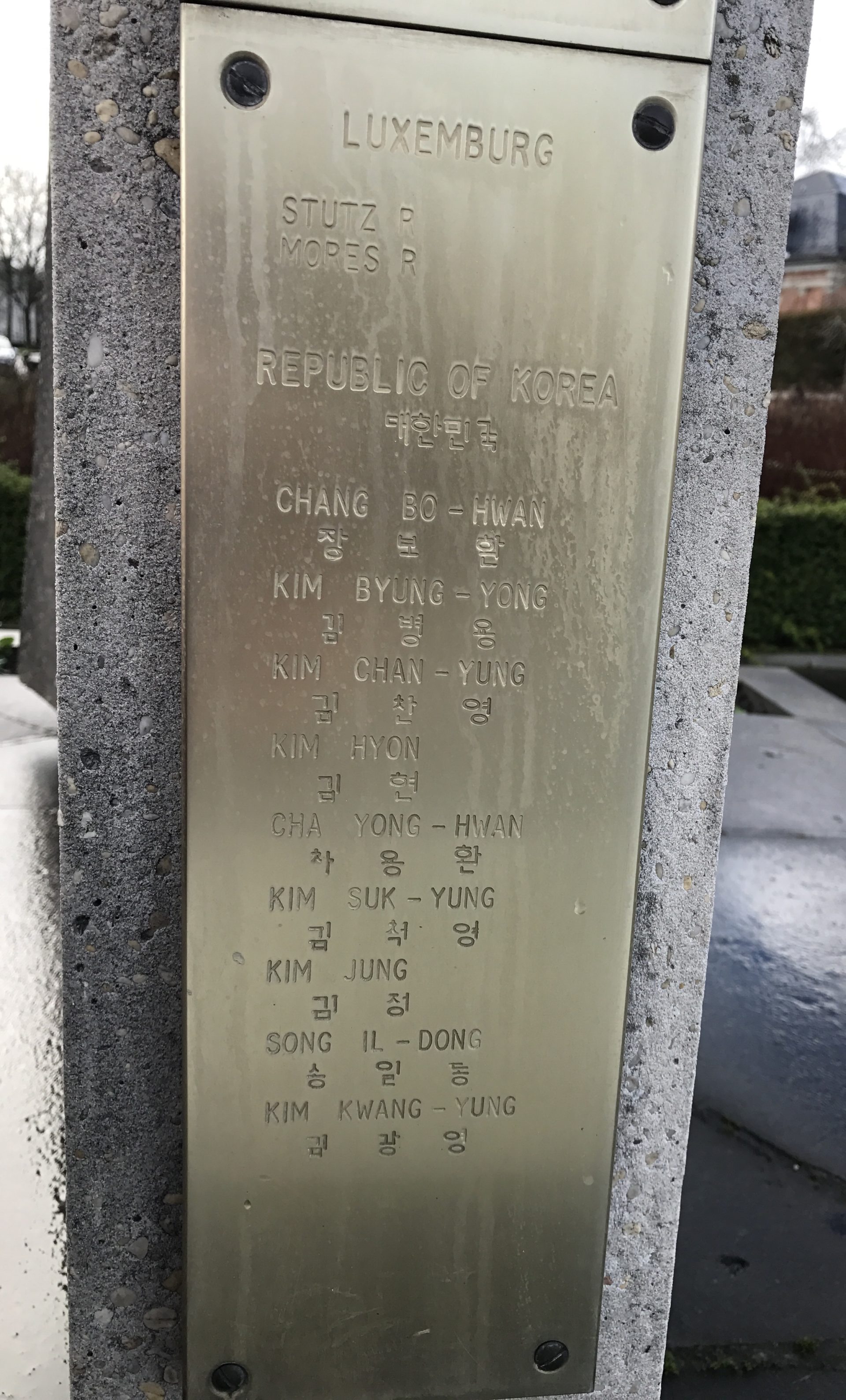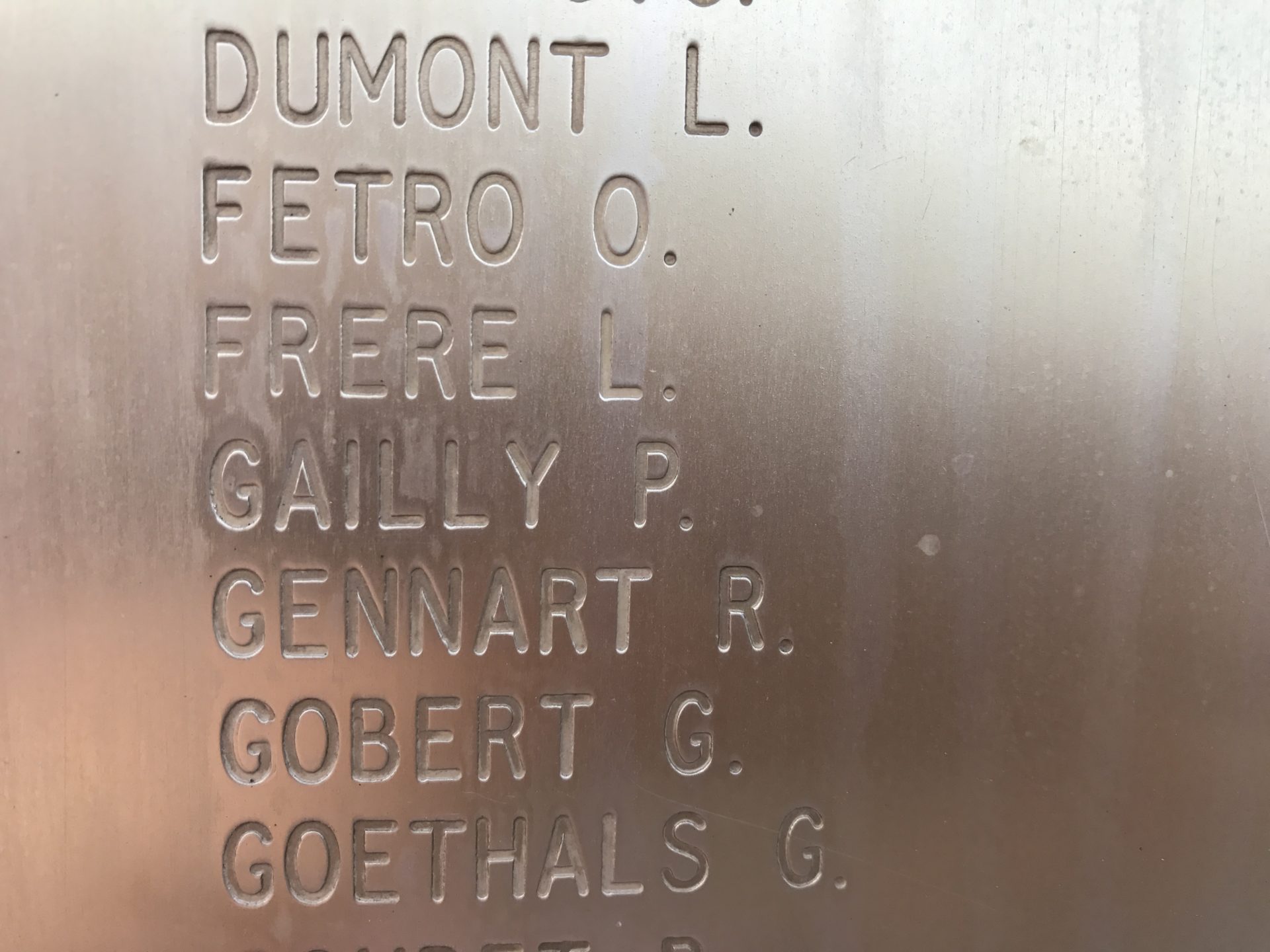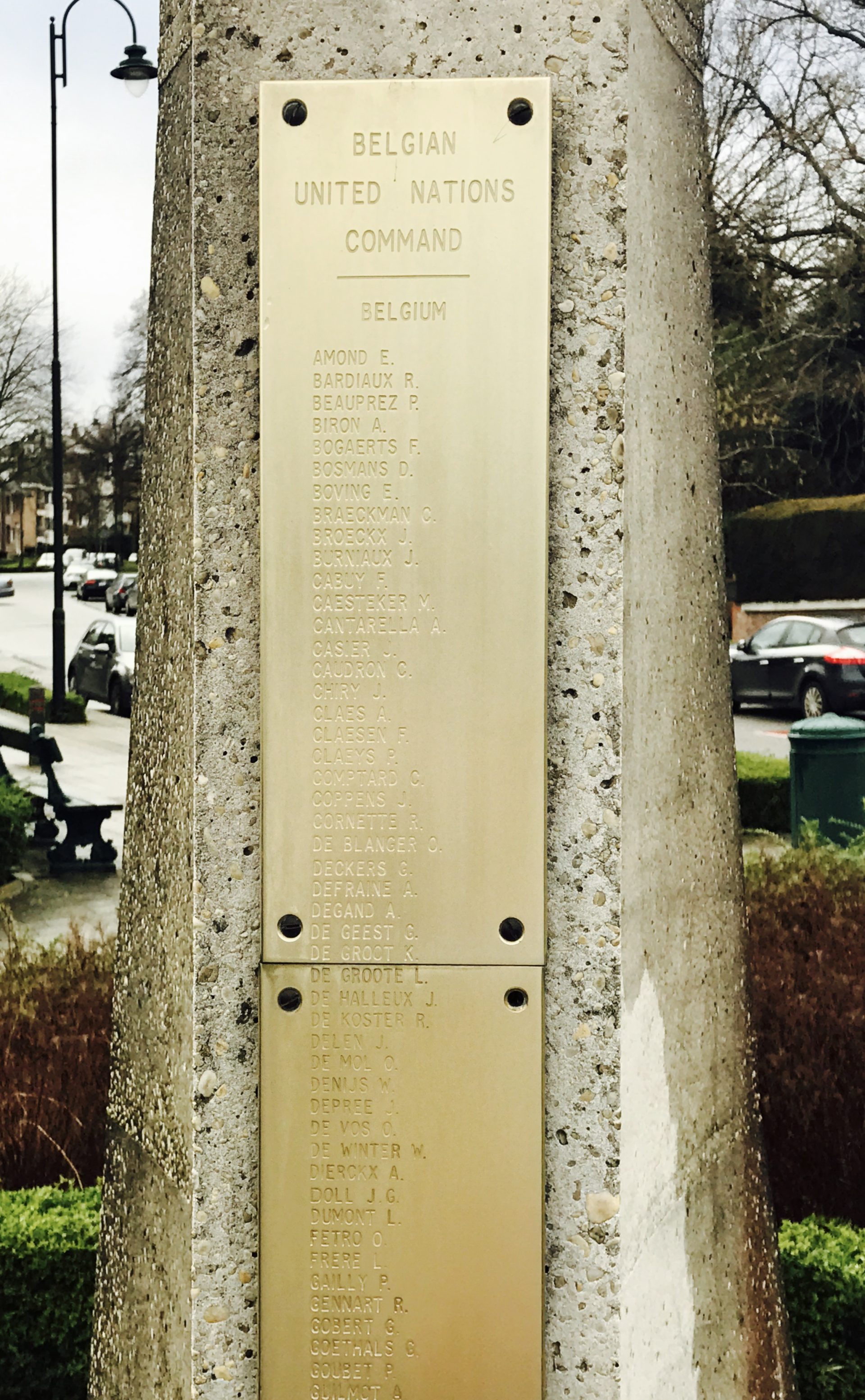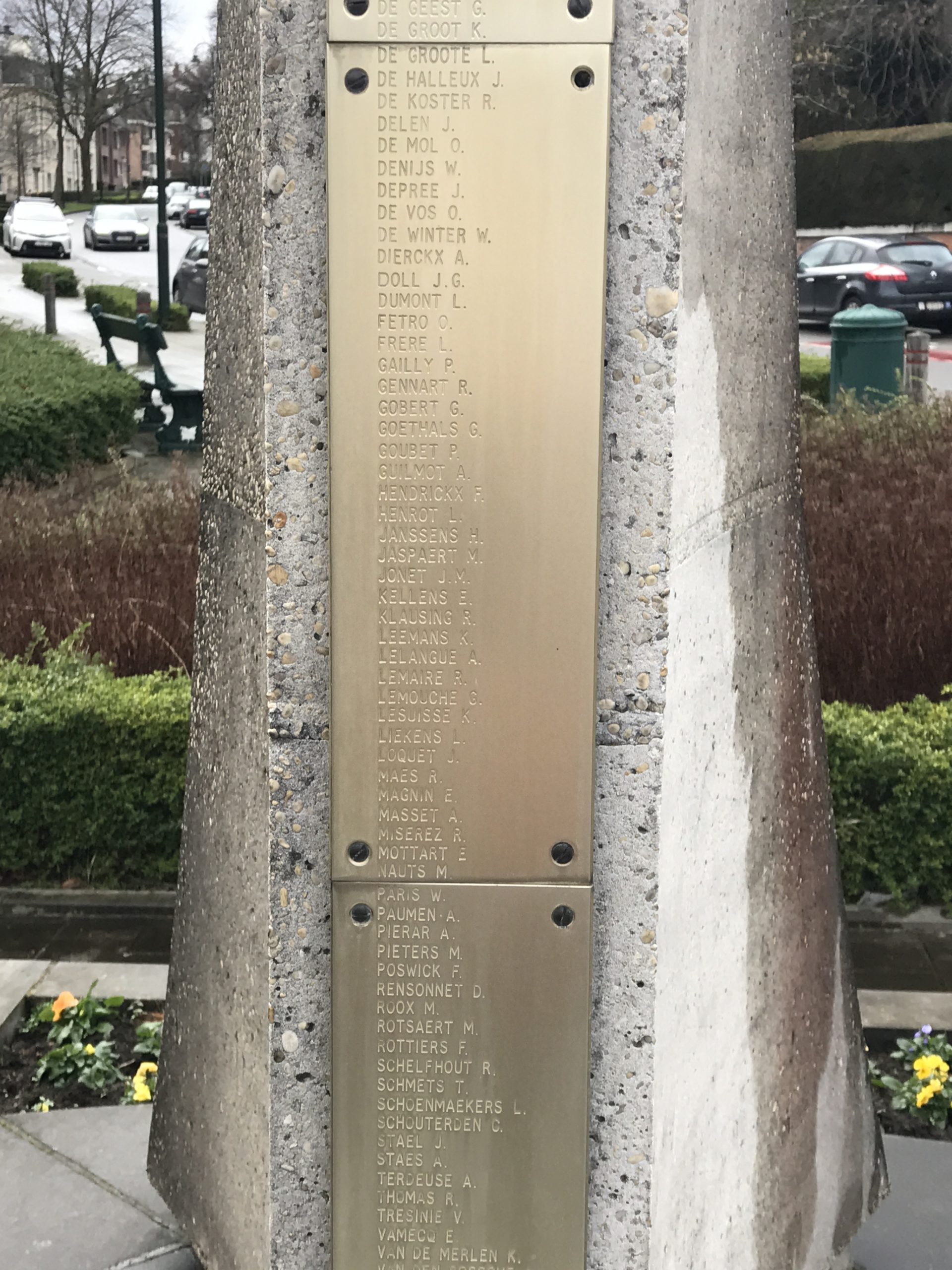Veteran Stories
>> My name is Roger Verbist. I went to Korea with the first battalion. I joined the first Belgian volunteers on the first or second of October, 1950 and got trained in Belgium until we left on the 18th of December on board of The Camina to go to Korea. It took us 6 weeks to arrive at last in Korea, in Busan, after a not-so-pleasant trip because the ship was not made for so many people. We were overcrowded. Anyway, we arrived at last on the 31st of January '51, in Busan at port. After that, we went to a trainings camp for a week of adaptation equipment change because we were fully equipped with the good old Belgian army coat and everything, which was really not adapted for the Korean thing. Also, to sleep, we had five, six blankets, which was really uncomfortable or impossible to take with you. Anyway, so after 1 week or so change, in 2 weeks maybe, where one nice remembrance is that we went training at night. Our second in command, Major Vivario at that time, he became later lieutenant general in the Belgian army, head of the Belgian army, but at that time, he was a major, second in command. He took the whole battalion out on a night exercise to get adapted to the mountains and everything and the hills, and we left in Indian file, and when we came back, he only had two people behind him. All the rest of the people had been lost. But anyway, we came back a few hours later to the camp. After that, we went for another what they call [INAUDIBLE] and said [FOREIGN LANGUAGE]. It was [INAUDIBLE] of course between guerrilla and [INAUDIBLE]. After there, a few things, at last, we could go to the front line at the Han in the winter that time still, quite cold at the Han and everything, stayed there in position. Anyway, we crossed the Han and moved to the north. We had in April the Battle of the Imjin where we got surrounded, and as I said, I had nothing, but I've seen it all what happened there and everything. After that, we had some relative peace when we went to the neighborhood of Gimpo, the other side of the Han. That's where I took my first rest and recreation holiday in Japan and where I got promoted from corporal to sergeant for the Battle of the Imjin. Anyway, after that, we had, with the first battalion, a lot of [INAUDIBLE] which have been explained by General Crahay in is book. [INAUDIBLE] participated on that, and while I was there, on the 23rd of March, we had a fight before the Imjin, even, on the hill where I had some personal experiences and killed an American observer and some Chinese, but okay. I never had any. It was not my fault. He shouldn't have been there in the dark at night. We never knew he was there, but he was a hero, really, this guy. But anyway ...
>> Explain what ... Explain a little bit.
>> Explain?
>> Uh-huh. What happened?
>> Well, it's never ... You see, it was what they said, hill 155, 3 kilometer out of [INAUDIBLE]. The C company, which was my company, and the third platoon, we had been progressing, and in the afternoon, we took over hill 155 from an American company. I don't know which were the guys, but they had taken the hill, and they were still everywhere, Chinese around foxholes and everything, some still smoking from phosphor and everything. Anyway, we took over the top, my platoon, the rest of the battalion. It was the top of the whole thing. The rest was down. The battalion was everywhere. We had the top. So the lieutenant, the American, I still remember. When he left, he said, "Oh, guys, I would be careful. You probably will get a visit tonight." He meant from the Chinese. Anyway, we had foxholes, and we threw the bodies off. I don't know if this [INAUDIBLE] threw them off. We took over the foxholes because they were [INAUDIBLE], and we settled down for the night, but we had been working just with a little backpack, so nothing, sleeping bags, nothing, nothing, nothing real. Anyway, at the certain time when it got dark, they said, "Ah, the trucks arrived downstairs at the hill. One-third of the platoon can go down and get the kit bags for your sleeping bags for the night," and everything and everything. So instead of 1/3, about 25 people went down. We were left on top of the hill with maybe 10 people. That was all. So while they were down to pick up, we got attacked by Chinese, and the first thing I heard, I was in a foxhole. It was when a grenade fell in the shoe of the companion who was with me. He had took off his shoes. He was not supposed to, but he had done anyway. A grenade fell in his shoes and rolled away, and his shoe exploded. He had size 46, so at around maybe 3 months later because they didn't serve the size of shoes on his gymslips. Anyway, we got out. They were all over the place between us in the dark, and I got out, and I did something to some Chinese [INAUDIBLE], and as I said, very dark, confused. One guy came getting up on the thing, and I couldn't tell. It was an American first sergeant, I found out later, an American first sergeant major, who was an observer for the motors. I didn't know he was there. Anyway, I shot him, and he died of his wounds later, so I still thinking ... I have never known, knew his name, who he was or everything. That was one thing that, if you say, that after that, that I said we did. After May, everything got more quiet down, a little bit more comfortable, so then after the day, the day after that I shot this guy, General MacArthur came on visit. Oh, yeah, I met him downstairs. They called me down. In effect, he said, "I know what you did. Don't worry. You did what you have to do. It's not your fault," and at that time, too, the chaplain of the battalion came to me said. He said, "Oh, you know, I have some bad news for you." I said, "What?" He said, "Your father died." I said, "Oh, yeah?" I said, "When?" He said, "Well, in the middle of January." I didn't know, so I said ... Well, he said, "Yeah, we apologize that you've been advised so late," and so on and so on. And then he said, "Do you want to go to Belgium?" I said, "What am I going to do in Belgium now? He's gone 2 months already. Now you tell me, so, no, I don't want to go to Belgium. I stay with the battalion." So then, anyway, the first battalion went back home somewhere middle of August. We had to take the General McRae to go back to Amsterdam, and about 400 of us went back to Belgium. In Belgium, I had 1 months of holiday, and after that, we joined the first airborne battalion to get parachute training which I did obtain my parachute training. At the beginning of January, I was qualified and everything, and then I was giving training to some [INAUDIBLE]. That time, they had draftees. We still had draftees, so I was training draftees in [INAUDIBLE]. I didn't like it, so I re-enlisted for Korea, and the 3rd of March, I went back to the training center of Korea in [INAUDIBLE], stayed 1 month, and I rejoined the battalion where I arrived. I left Belgium again on the 7th of April and arrived on the 24th of April, just in time for the celebration of the Battle of the Imjin where there was a ceremony there. And there, at that time, I decided, and I said, "I'll never go back until the last Belgian goes back," and that I did. I stayed until '55 until the last Belgians had to come back.
>> [INAUDIBLE]
>> No. If you're interested, in '54, but then after the third year or second year, you got 1 month of holiday in Japan, and regular R and R, like they said, famous R and R. I had people I knew in the embassy. In fact, one of my friends, he's married to a Korean. Her name is Kim, by the way. They have this shop in [INAUDIBLE], very famous, really became rich, she did, very aggressive saleswoman and everything. No, they have a very good company. It's still existing, Pagoda, in [INAUDIBLE]. It specialized in Oriental stuff and everything, and that's why I learned my wife, my friends married her. I went to their wedding party in Tokyo. One year later, I also went to the celebration of their first baby which was born in Tokyo, so I've been kept in touch with them very much. I learned my wife there, and I went back to Korea, and then I applied for permission. You had to have permission to get married that time. Oh, yes. There are a lot of regulations. I still have them. In fact, you had to do this and that and that and that and that. I did all that and brought it to the embassy in October '54 to get married, and I came to the embassy. This is another story, and the chancellor said to me, "I'm sorry. I can't marry you because the Belgian government changed the regulations. If you want to marry, you first have to go back to Belgium, stay 1 year there, and you can't come back to Korea. You have to bring her there and everything." He said, "I can't marry you. Everything is okay, but I can't marry you." Said, "but," he said, "Do you want to get married?" I said, "Sure." He said, "Okay. Tell your wife to go to the local administration not outside of Tokyo." I said, "They don't have the instructions yet." I said, "Get married for Japanese law." And he said, "If it's Japanese, and if you're married there," he said, "You bring me the papers. The same day, I make a Belgium passport for it." That doesn't exist anymore. At that time, it was. "And you're legally married because Japanese law is legal in Belgium," so we did. My wife went to ... We lived in Tsurumi between Yokohama and Tokyo. She went there. In fact, I didn't even go. She just brought all the papers. No, I was staying at home. She took two witnesses, and they witnessed, and we were legally married. So I went to the embassy. She got a passport. It's the chancellor who did it. I was not supposed to do it. He was a very nice fellow, so that's it. So then I stayed until '55 in Korea until the last one and came back on the last like everybody else, and wife rejoined me.
>> After the armistice in 1953, July 27th, what were some of the things? Because people think the war ended, so everybody goes home, right? But you stayed until 1955.
>> Mm-hmm.
>> What did you do there after the armistice?
>> '55? Well ...
>> No, after the armistice, what did you do there? Why did you stay in Korea for another year and a half?
>> Well, we had still some obligations to the American thing and to the United Nations. There was not officially, shall I say, a peace. There was a cease-fire, but still, they still have demarcation line, as you know, so at that time, we were still there at the first time. They still expected some attacks even after that from the Chinese, so we were staying there on the line, occupying our position. We had to move back so many kilometers to have the demarcation zone. We had to move back. We occupied and just stood guard like we did before except that we didn't get artillery shells and everything for the rest. Then after 5, 6 week, we went back, rotated, got in reserve, and there, we did like the Belgian army does when they're on the camps, and we're training, exercises with the Americans, tests, to compare our combat readiness, tested by the Americans, which, by the way, we came out first of the whole thing. We had 87 percent, I think. We always used to love the [INAUDIBLE] They wear those big boots. They couldn't move around, so I think we wear just a normal thing. We moved around like that on the hills three times when they moved. That was the thing. We were training just like, as I said to him, hasn't known this. He has just known the period in Korea at the beginning there when there was every day moving up mountain, down mountain, up mountain, here a shot, there a shot, attack, this and that, never ate really. At night, you slept in a little hole and everything. After that, from when I went back in the beginning of '52, '51, things had changed completely. Before, it was a moving war, and every day, as I said, up and down, up and down, up and down. You never had any food, C rations and things. After that, when we get a static war and got on lines, it changed. We had tents where you had certain periods on line where of course, you were in bunkers and had some attacks and patrols, but once you were out of the line, in reserve or so, you had tents, beds, cots, to sleep on. You got a bar. You got food instead of C rations all the time, so conditions changed completely, and I said, I've had worse training in Germany as I had there in Korea at that time. That was the thing, but we stayed there because they wanted, how I shall I say, to have the representation of a Belgian thing. That was 200 people they chose who stayed.
>> Mm. Did you go back to Korea?
>> Huh?
>> Did you go back to Korea after the war?
>> Yes. After the war, as I said, after Washington, I quit the army after 6 years at the embassy in Washington. I quit the army. I took to my pension after 20 years, and at that time, I was 38 years old, so I had to make a decision. Am I staying in the army, no promotion until I'm 56 and then retire, or am I going to try to do business, a career in private civilian life? I decided to get out, so in fact, I still have my blue card as a permanent resident of the United States, but my wife and my daughter then, they wanted to move out, and me too, out of Washington, so we went to Hawaii and lived 1 year in Honolulu where, in fact, I got my first job as assistant manager from the Hilton Lagoon apartments. I don't know if you know Hawaii. The Hilton Lagoon, I got there. After 1 year, my wife and daughter, and me too, said "Always this sun, always this beach. Let's go back to Japan," so we moved to Japan.
>> I asked whether you went back to Korea to ...
>> Yeah, well, that's what I'm coming to, yeah? So was in Japan, I start working in civilians for civilian transportation, German, Japanese thing. I went. I had very good relationship with ... It was in the air cargo business, so I had very good relationship, first of all, with Korean Airlines, and I had to go at least six, seven times to Korea as civilian then for business.
>> What year? What year?
>> I was in from '76 to '90, I stayed. I was in Japan, but as I said, at that time, I traveled to Australia and New Zealand. I'm doing what you're doing now, I did many times before: the States, Canada, Australia, New Zealand, Thailand, Hong Kong, China, Europe. I did that at the time, but I went back at least four or five times to Korea for business with a certain Mr. Lee. There are also many Mr. Lees and Kims. I've been back many times.
>> When was the last time you went?
>> As civilian? The last time I went was in 2012 for the big Revisit Korea thing.
>> Oh, and so it was very different from when you went for ...
>> That's what I've told him. He remembers, and I remember, first time where we went in Seoul, I still remember the railroad station. Everything was in ruins, and everything there in '55, when I left, was already quite a different change, but not like this, but I told him. I said, "You're going to be surprised when you're going to [INAUDIBLE]," because it was still in his mind this way. Anyway, but it's the same in Tokyo. When I was first time in Japan in Tokyo, it's nothing. Now, the last time I went to Tokyo was maybe 4 years ago. Every year, and I lived in Tokyo [INAUDIBLE] between Tokyo and Yokohama, 12, 13 years there. I lived there. When I left in '90, came back to France because I lived in France, and I went back 5 years later, I didn't recognize Tokyo already: new highways and everything. And every time I go back with my wife and my daughter now, it changes so quickly.
>> Well, so let's go back to Korea.
>> Yes.
>> So, did you think of ...
>> You know what?
>> The people, I mean, what you experienced now towards the end of ... You visited again recently in 2012, and, you know, it's very ... You say, it was very different, and, I mean, just the people. Explain a little bit more about what you felt because you were there when ... almost 70 years ago.
>> What I saw in 2012 was the normal Revisit Korea program. We went to Busan to the military cemetery, or to the United Nations cemetery, to visit. We visit [INAUDIBLE], a few ceremonies in Seoul and things like that, ceremonies and medal and things like that of the normal program, but I was amazed by the efficiency. This tour was organized, and as I said, how they took care of us, that amazed. There was just another couple who was in a wheelchair. They were waiting at the airport. Took us there. I said, everything was perfectly organized because I have been worried. I said, many times, I worry when Korean veterans, Korean nationals, came to visit Belgium, they didn't get the same reception. Much less, huh?
>> Okay.
>> I found that regrettable.
>> My name is Philips Armand. In English, Armand, the British English. I was in the third battalion volunteered with Korea with Roger, my friend, and the make ... The meeting was in Belgium, three battalion to go to Korea. The UN, United Nations, ask, and one battalion complete, but Belgium has never can come to the number of 650 men like the English. They only had 600, 700 people, but one-fourth of it is administration. Fighters was not enough. It was 500, and all of the English were 800. Belgium wasn't the right force to go. Then we made a prepares to go. We're coming to Korea. Roger says with all the dates and began ... Busan, is it Busan? We stay a little while in Busan, and then we move higher and higher. Along way we helped ... We make a ... with the American Army, but Belgium Army has British weapons and the equipment, all British and a Lee-Enfield rifle, the old one. The US go, "No thanks, to Belgium, Put them over there," because we cannot give them ammunition, and it was just ... Put your gun away and take another one. That was a diplomatic difference over there, and after the Imjin is over, go on, go to America, so Roger was free. I was away in this moment. Then we do this the same way, Busan, higher up to the 38th frontier on the Imjin, and that you know. You know that. And along the way, we have made the [INAUDIBLE] and was looking for the invasion of the Chinese soldiers. When the Belgiums were on the boat, the Chinese, not the North Koreans [INAUDIBLE] were something we never see. I never see the North Korea. It was China. China was behind it. And they [INAUDIBLE] onto Seoul, bombardment of American Seoul. Seoul was a wreck, completely horizontal. No people over there and the Belgium battalion [INAUDIBLE] over the Han River to platoon, with a platoon to look if there was enemies where they is, but the Chinese were away. They were going, and we never known why, and we did a night patrol over the Imjin, and my platoon commander, the lieutenant, was the leader, and I stayed with the others on the other side. They said, "Spend the night over there," and when they come back they ... I was watching on the land mine, and the Chinese have their little dynamite box on the Han River, on the side, for the tanks. There were tanks, and that is with the wire to the big one, 2 kilo and a half dynamite, and the tanks of America has changed before. They cleared a little bump. They can't ... But the big bomb was here and the little one there, 5 meters. When the little bomb sprang, it's with the chains, but the other 2-1/2-kilo dynamite was under the tank. They're smart, this one, and my platoon commander was leader, and he was floating 8, 10 meters in the river and on the ground, and commander of the company was dead and two or three American officers, and the tank was finished too. On that moment was I platoon commander, as Sergeant First Class. It was in the company C. It was platoon A, B and C. [INAUDIBLE] was in platoon B or G ... B or C? There was no platoon. There wasn't one platoon. I was second-in-command, and I make [INAUDIBLE] platoon something to say, but afterwards, platoon commander. I was first sergeant, Sergeant First Class, and all the time from the Imjin and that, I stayed around the Imjin. I got shot. Now I just would finish it, but the Battle of the Imjin. When we come on the Imjin River, in Panmunjom was the peacemaking, right? Come on, it was starting then, but we're still staying on the way, on this side of the Imjin, but the British have let go the Belgium on the other side, and there was a bridge over with ... a military bridge on the Imjin River, and they put the Belgiums on the hill sometime, and there was a platoon. Roger's was on the right. I was in center, and another group was ... platoon, three platoons. We have communication with the radio and telephone, booby traps and all the things, wires [INAUDIBLE] like the Belgium Army with the protection. Then the invasion was coming, and in the night, the battalion commander, the colonel, said, "They will not come now because they have need 2 days to come from higher on the Imjin," right, higher up. [INAUDIBLE] was somewhere. We have time to make the defense here, but the Chinese were very quicker there, and we have not finished anything, and the Chinese ... Well, the Belgium battalion or the platoon, we are maybe 90 persons over there. The Chinese come maybe by thousands along the hill, and we got surrounded by the Chinese, and [INAUDIBLE] then my platoon commander was coming back over there. After the commander was over, I was again shot. I got a bullet in the rear. And then was I platoon commander, and I will see in a moment there's no more ammunition. The day and the night shooting always, grenade [INAUDIBLE] not much ... Let me see. [FOREIGN LANGUAGE] ... wounded, wounded, a lot of wounded people, but not too heavy. And I was there in a certain moment. There's one corporal. Combat is ... the machine gun. They say, "Adjunct." I stay adjoint to the platoon. They always call me Adjunct. I was commander of the platoon because of ... And he comes away, and I see in the slit trench was when you go was around and make the connections make a place for the men. When they go up to come to the center, you see he has no main cover, and one of those corporals comes to get the machine gun and say, "Adjunct, it's no more good to sit around [INAUDIBLE]," and I run toward him. I say, "Go back," and then I gave him a [INAUDIBLE] ... And he's as far as I am, and on the look for my left, there was a little horse with an officer, North ... from North Korea or the Chinese, and two men were the problem, the little problem, the covered problem [INAUDIBLE] and one of the men stood because that was the way of coming up, up over the hill. He makes a ... and one of the moment, I gave a shout to the other. He give ... and I got a bullet here and comes out here. I got my mouth open. My tooth was back here, but I got wounded, and then, a little bit before, my platoon commander was wounded. He was around 90 kilo. He's a very heavy Russian big man with four soldiers to take him away into the tent. They gave him a shot, can no more do. No more can aid than that because there was a war on, and I had command to the people, and everybody asked, "Ammunition, ammunition, no more," and the British have a basic load, the double. Leave it there, and we'll take over, but the ammunition stays because we have to sit, but we have double ammunition, and the night, after the night, was no more ammunition, just shooting all the night, all the night. And we take care of the officer in the tent, give him a shot, and I take the platoon over. When I was shot, I asked for the oldest sergeant, oldest. That was Roger. I didn't know very well, but he knows. I came to the commander, and I say to him, "You have joined the company staff" because in the war, if you give over command, you must give him the order if you continue because there's no more ammunition, and the company was on the right side, and I said, "You come back to the company," and there was a mistake. I don't know what's happened. He's going up in panic. They shoot and grenades. He says to the men, "Follow me," which means, "Follow me," but I tell them, "You go to the company. That's the orders." It's the right thing. If you don't do the order, you go to ... You're punished, and we have 2 year in the school. We know what we have to do and not to do, and he was in the same school as me, and he says, "Follow me," and he run to the staff over there, to the Imjin, and the colonel put him away and put the people back, and at that time, we must evacuate with the officer that [INAUDIBLE] and he don't want to go. He stand up, and he's falling on the way somewhere in the corner, and I was not shot at this moment, and a bit later, I gave over the orders, and I go, and the people say, "We go with you [INAUDIBLE] it's under" [INAUDIBLE] no, no, I go. I say, "I'm finished," but with the bullet, I ... And I see my officer in the gate somewhere and the jeep with the doctor and the boss there. I was running to look for them. Was maybe 500, 600 meters after them, and I see him, and I go. I'm trying to look for them since I can't continue. I was wounded too, that bullet here, and I see the jeep for the doctor, and I go, and when I was on the jeep, I heard a commotion, and I say, "Benoit is over there, the officer," and they get, and they haven't found him, and they gave me the paper, confirms latest ... Roger has it. I have saved his life on that moment because I say to the doctor, "[FOREIGN LANGUAGE] Benoit is there, my officer," and I approach them, and we were in the same in Daegu, in the hospital, and in the helicopter, he was on the left side and the right [INAUDIBLE] Russian and we go to Daegu, and the hospital in Korea is in South Korea. Well, it's still Korea, and in Korea, I was wounded, could not solve it. Must go to Japan, and he was going to Japan too, but I had no way of knowing. We were not in the same plane, and in Japan, I see him back. He was come to visit to me. The bullet was gone in there and out. There's nothing touched on the inside. There was a second wound for him, and he was with the colonel [INAUDIBLE] too. They come to visit. They said, "Thank you, good job. That's it [INAUDIBLE] you see," and a salute and this in the hand and gave me a paper later, but I stay 4 months in Tokyo because it was very ... And because the bullet hit my tooth and go in and here, it was in my right ear was amber fluid, they call it, here, and there was always ... And there was a Japanese doctor, very old, that was used to seeing things like that. The Japanese always have been in the war, was one of the doctors, and the major, a black man, negro, major. One of the first, highest officers I've seen in my life. He was major, a big one, you see, and the Japanese, the old doctor, said to him, "We must do this one [INAUDIBLE]," and they gave me a shot, go to the room, and it was with a syringe, a pump but with a needle, goes in the ear to the place, and they pulled the amber fluid out three times, going back to the room, and then 4 months in the hospital, and a couple of time after was better and could going out, maybe dancing on the promenade later, but the doctor said to me, "Pay attention. You're wounded, no [INAUDIBLE] for you," so while I watched, and I have do. I do what he said to me. Well, that's my story. That's in Japan, and then ...
>> So were you able to fully recover?
>> What?
>> Were you able to fully recover?
>> Yes, they said at most there was a hole here and a hole there, here, under there.
>> But they've ... you ...
>> Put your ... Put your finger here. Push, push, do you feel it? That's the wound I was given over there, and the bullet just ...
>> But now you are okay?
>> Lots better, I don't really ever hear, the ear is sort of imperceptible. I always look like this.
>> And did you go back to fight?
>> No, no, I must stop [INAUDIBLE] and go to Belgium in the first boat, and it was a British boat. We stayed 14 days in Hong Kong, and then we go out there and to Liverpool. In Liverpool, England, in the plane, a DC-3, go to Brussels, and my parents were over there, my friends. It was a homecoming, everybody.
>> Yes, did you volunteer?
>> [INAUDIBLE]
>> Did you volunteer?
>> Yes, I was ...
>> Why?
>> I was in the military school for noncommissioned officers because there was no more for all the old officers after the war. The school, the school of the cadets, as I would call it, was for all young people, has them in the order, the school. That was not exist, but the noncommissioned officers was open, sergeant and the [INAUDIBLE] and I go, and then we see, and when it is over, I go to the para-commando in Belgium, parachute [INAUDIBLE] the commander and was ... And then, I am sectioned by the commanders in Belgium, and the first time that the Korean War are announced and volunteers, I all say, "I am in the army. I know very good the rules, just not the logistics," and that's no good [INAUDIBLE] can do this and that, but the action of the war, they don't know what it was. We have seen it in the film, like the [INAUDIBLE] said, "The Korean War has come." I said, "I go," not because of the Chinese or Korea, but for to learn something. When you have 18 years or 19 years, sort of, I know you hoping for your life, and we are careered to handle that. We know each other in the Leopold [INAUDIBLE] Belgium, and we are in the same company.
>> You came ... You went, and you came back wounded. Did you regret that you went?
>> No, no, I got the pension. I asked for it. I am an old war elite and a big one, more than 50 percent, but [INAUDIBLE] but that sound like the good, I have the one on that, and I was married at same time, and I had a boy. I lost my wife 7 years now. I am alone in the house. I got a grandson and a son. I have no many contact. Contact is okay, but I'm better alone with my little dog, and I lose him, and I'll make a [INAUDIBLE] four, number four, but I'm still a little bit sad because there was no more there, and I was only a line, only alone, and now I don't see him anymore. He got this [INAUDIBLE] and I ... That's my life.
>> Did you go ...
>> And then we have ...
>> What did ...
>> ... we write a book of what we do in Korea, and I was the beginning, and I gave him two books on the other, when the embassy was still on the older side in Brussels. Maybe in the library [INAUDIBLE] you can find. The book has maybe stay over there. There's a book about over the Imjin and the company C, company. I said [INAUDIBLE] there's still two [INAUDIBLE] ...
>> And you ...
>> But if you want to know more in detail, it's in the book.
>> Okay.
>> It says the one ...
>> And you ...
>> ... "One Season in Korea" because we still stayed 3 or 4 months, the wounded, and then the platoon was [INAUDIBLE] we put the people in the other platoons, and the commander was liquid and me too, was finished and the reorganization ... And that's the stopping them on the Imjin [INAUDIBLE].
>> Last question: You revisited Korea. How did you feel?
>> I ... We do it with Roger. We go together. That's 3 or 4 years ago, and we are still candidate to go, but the nationalists, I guess ...
>> How did you feel? How did you feel when you ...
>> I was ... I can't explain this. It was special, really. The special was in the [INAUDIBLE] I went to Busan over there. Then after, we contact them at the Korean [INAUDIBLE] the special forces. They gave a demonstration, something that ... more better than the Belgians. I cannot take out the ... always the taking out [INAUDIBLE] was very fine in the military, and then Roger was the spokesman on the table with the big boss over there. Then we had the medal decoration, like that. Yeah, that was very fine, very good, but the boss, the best over man over there, this was him. He know everything about Korea. It's 4 years over there, yes, but you must [INAUDIBLE] ask. If it's not possible, then the library. Yeah, over there with the books, maybe you find the book over there. It's "One Season in Korea." [FOREIGN LANGUAGE] it's in French. I gave two ... Maybe it's the officer.
>> My name is Declane Louis born 12th June, 1931. I'm Belgian. I served in the Korean Battalion from the 7th October, '50. Joined a ship the 18th December, '50, to go to Korea. We need ... Our ship was a very, very quick ship, and it's only 41 days, normally 35, okay? You see, first ship, okay. We start with landed at Pusan the 31st of January, '51, and there, we're leaving to a little camp on river. I think it was Nakdonggang. I'm not sure, and we stayed there, and we saved some equipment? Why? Our equipment was very nice. We need everything. It's easy. After 8 days, we went Nakdong River, Nakdonggang, supposed to be fighting against guerrilla. I never saw a guerrilla, but we went several times in the mountains. After 1 month, we won. We were leaving to the frontline. It was in March '51 in a train, a wagon, not Volkswagen, an old wagon, and came at ... I think I mixed up the names ... At the village near the Han River, Hantangang, and my platoon was immediately on the line at the OP. I was an OP-4. They had OP-1, 2, 3 and 4. I make the OP-4, and I was surprised to see for the first time in my life a rifle that's shooting at night. I never saw it. [INAUDIBLE] green thing. The morning at the Han River, there was some fog. You know what I mean? Incidentally, wind comes up, and all of a sudden, [INAUDIBLE] that was a village and an ocean officer, and this ocean officer was talking with a Korean, okay? I remember this officer. Why? He have a big [INAUDIBLE] his boots, golden things, the North Koreans don't have this in this time, the Chinese certainly not, and I know that's in '47, okay? When I saw ocean soldiers, '47, okay? After 3 weeks, I think, we were leaving and making offensive to the north. The north was [INAUDIBLE]. There was no bridge at Seoul. There was only a ship bridge into [INAUDIBLE] and the field battle that we have was at Uijeongbu. There we lost our first man [INAUDIBLE] company, and he was in Charlie Company, the first soldier to die. Okay, meanwhile, I forgot to say at [INAUDIBLE] we make the first combat battle my platoon, the combat patrol on the other side from the Han River, and the Chinese [INAUDIBLE] move, which was maybe, maybe not. And I know that after [INAUDIBLE] this of the Han River was full with mine, all that I know. That was before after [INAUDIBLE]. Then after we go farther to north, and we will leave the 187 air bomb, jumping behind the lines. I don't know if you know that, 187 air bomb jumping behind the lines, and we are the first to leave quickly against all the people to move forward to the north. And we leave the 187 air bomb, and from there on, we went on to the Imjin, Imjin. We changed from American to the British. Why? Our rifle was 707, 703, anyway, something [INAUDIBLE]. It was too long a time ago, and the British went in the 29th British Brigade. A big thing that I'd like to say, our battalion was only 699 men and not 1,000. Mostly people say one battalion, would say 3,000. No. We are still of 700, complete battalion, until 1953 with the relief to get [INAUDIBLE] 3,000. Don't forget it. It's easy to say 3,000, but we're only 700 men [INAUDIBLE]. American, 1,000. Korean, 1,000, and we never go back, never. We hold whole time our position. That's all that I can say about Imjin after the Chinese attacked on the second day of April, I think. I remember [INAUDIBLE]. Why we're surrounded? British take us north of the Imjin. and all the people British on the south of Imjin. We are surrounded. We had broken the surroundings and tried to deliver the [INAUDIBLE] battalion that surrounded too and completely down. The Chinese [INAUDIBLE] prisoner camp. Then after we retreat until Kimpo. From Kimpo, again, attack on the Imjin. Imjin was finished, a second Imjin. From there, this was the beginning of the position, means trench, bunkers. That was the beginning, June, July of '51, and the whole [INAUDIBLE] the Belgian fight and the antinaval just the same. We're on the front. Why with the [INAUDIBLE] and not with the other? Yeah, that's it, tactical. Okay, and I make all the rest [INAUDIBLE] in placement to stay 30 days on the front line. I stayed 55 days, and after several attacks from the Chinese in a still hold position. The Chinese never gained in our position, never. That's all that I can say. What about after? I came back in '53 the 4th December and the 4th November, '53. They came back in Belgium the 4th December, '53 [INAUDIBLE] holiday, and I joined the Army, first the light infantry and then after Belgian airborne special forces. That's all. Something further?
>> Have you been back to Korea after?
>> Sure, and I like Korea. I was surprised, really surprised. The first time I went is after the Olympiada.
>> Olympics.
>> No, no, just after, and I was surprised. I know Korea from before at landing, Pusan. It was terrific to see it, all these people leaving from the street. Impossible to believe it [INAUDIBLE] left and right and dogs and cats, and then I came in Korea, and I saw a beautiful nice, little country, all these highways, buildings, buildings, building, bridges on the Han River. That's impossible, and then I went in the tunnel that not Koran did. You know that they make it to inside? And I was proud that the Korean soldier hear it and said it to his officer. That's all. That's enough.
>> Well, thank you so much for your service.
>> Okay.
>> And I hope that you will visit Korea again and again because ...
>> I hope so.
>> ... it's very, very advanced, right? Very advanced.
>> It is. The last time I went, a few years ago. I went to [INAUDIBLE].
>> You're young. You're young.
>> Hey, old papasan, don't forget it.
>> No, no, no, no, you're young.
>> And my wife is a mamasan.
>> Yeah, mamasan, yes.
>> Okay like that?
>> Yes.
>> Good afternoon. My name is Raymond Bier. I am the national president of the Korean Veterans of Belgium, the Belgium United Nation Command, BUNC. I was born in Limburg, one of the nine provinces in Belgium, in October 1933. As I went to the military school, I had to wait until January 1953 to go to Korea. When I arrived in Korea, I saw a country where the children were standing in the mud. On the way, I saw the papasans and the mamasans carrying all kind of things to build sheds to live in. Children were asking for some food, and I thought, "What did you do? Where are you came? You came to a country where we had the same problems as we had between the War '40, '45 with the German." When I came to my company and the Chinese attacked Shadko, the old papasan, and we lost many people, and soldiers were crying for their mother. I was sitting. I was moderating one. I was sitting in a hole, and my friend who lived 32 meters from my hometown, and he would go home next month. He was killed in front of me of 1 yard, and I was thinking about friends. Okay. War is no good. Afterwards, I came back to Korea, and I was invited by the Korean people [INAUDIBLE] a restaurant in Korea. It's so good, and they asked me if I could give them an interview and the lady who watched me, and she said to me, "Mr. President, are you certain that your friends who were killed in action in Korea are worth it?" And I didn't have to think it over. I said this. When I left Korea in 1953, I had to cross the Han River on a bundle bridge. Today, I came to Korea, and I saw 32 bridges with six roads, and it's not enough. They're still building them, and when I saw in the museum the little children who were all in dresses from their schools in yellow and blue, and they were waving with the flags, and they were happy, and they're laughing, and they say, "hello," to us. And I saw the old people driving [INAUDIBLE] with a bicycle and having such high products on their bicycle, and they were happy, and they were laughing. Then I saw that the Korean people are happy. I saw that we did something for the Korean people, and yes, lady, it was worth that we lost more than 100 soldiers in Korea. That is Korea today. Today, it is the fifth biggest economy country in the world, and we are proud that we have given them a hand. I was not a general. It was 18 years, and I'm proud to have a second home in Korea. Thank you. [INAUDIBLE] of the the Belgian Korean Veterans is mostly the same as in all the other countries. We have nine provinces in Belgium. It is a little country, but we are very proud of history, and we have nine monuments, Korean monuments, and we are gathering, every province, are getting once a year to maintain our friendship, but we are also very close, and I tell you, very close with the Korean people. I send every year four students to Korea for the young camp, and I tried to send all those people who were injured in action [INAUDIBLE] disabled person. I tried to send them to Korea on the base of visiting Korea, and once again, those people, when they came back, they are telling me, "How is it possible that the Korean people treated us like [INAUDIBLE]." But we are getting old and getting no [INAUDIBLE], and there was a time to come, and there was a time to go. The time to come is gone, and the time to go is in front of us, and it won't last too many years, and we will be history. I wish you very luck [INAUDIBLE]. Okay.
>> Go.
>> [INAUDIBLE]. My name is Gorfed Gormumen. I'm 88. When the Korean War started, I was 21. I was a Korean War ...
>> [INAUDIBLE].
>> [INAUDIBLE].
>> And now I am a veteran as a Korean War volunteer.
>> Volunteer.
>> Volunteer. From September '50 ... 18 of September '50 to the end of the war was armistice. The war is still going on at the moment. It was armistice on the 27th of July '53. Then I stay in Korea a little bit longer, more than 1 month. In September, I was back in Belgium, September '53. Then I stay in the army. When I leave Belgium, I was a sergeant, and I was the leader of a squad. Then I stay longer in Korea, 1, 2, 3 years, and become sergeant first class, sergeant major, and then I was the leader of the weapon platoon then the third year. Then after we come back to Belgium, I stay in the army, and then I leave the army on pension as a [INAUDIBLE] officer.
>> What?
>> [INAUDIBLE] officer.
>> More for the moment.
>> And [INAUDIBLE] museum now? [FOREIGN LANGUAGE]
>> Oh, yeah.
>> [FOREIGN LANGUAGE] So you are now in charge of a museum?
>> No. Yes. The commander of the Para, it ask us to [INAUDIBLE] museum, and that we did.
>> And when was it ...
>> I must do it because [INAUDIBLE] Koreans. And I did my best to help that commander in [INAUDIBLE]. The 3rd Para Battalion take over [INAUDIBLE], and because of that, they build a museum. Okay. I did. I ask around to have some items for the museum. There were a lot of items, and I asked to send them to 3rd Para. Then after any time, I [FOREIGN LANGUAGE] ...
>> I was sorting out ...
... after ...
>> ... all objects that were sent in.
>> We started there with the museum in the late '80s, '87, '88, but the innovation, no ...
>> The inauguration.
>> ... inauguration in 1990 [INAUDIBLE] it is 25, 27 years that I do it in the museum.
>> What do you think is most important for people when they come visit the museum to know about the Korean War?
>> About?
>> What is it [FOREIGN LANGUAGE] museum [FOREIGN LANGUAGE]
>> Yes, the interest because the Korean War is known as forgotten war, and now when they visit the museum, no more forgotten. See? When you come in, there is a title, "Forgotten War," and when you come out, "Forgotten No More." See?
>> What are some of the more interesting things in the museum?
>> Interesting? Our battles. We don't have so much place. I must [INAUDIBLE] to our situations [FOREIGN LANGUAGE] See? And there's a theme. Around the theme, we have our museum. I can't show everything in museum. Our battles are the most important rings on our colors [FOREIGN LANGUAGE] on our colors of the battalion. The 3rd Battalion, they take over our traditions but not our history because the 3rd Battalion is ...
>> Forms.
>> ... founded.
>> Or founded.
>> ... during the Korean War, you see, and it's at that moment you take over colors, our tradition, but the history start later, and because our history in '50, September '50 [INAUDIBLE] and the 18th of September '50, see? I can tell much more, but do you like it?
>> When young people, okay, go to the museum ...
>> Oh, yeah.
>> ... how do they feel?
>> How they feel?
>> Mm-hmm. What do they think about it?
>> Yeah. Yeah, they don't know nothing. There's nothing saving Korea. What do the younger people know of the Korean War?
>> Very little.
>> Yeah, yeah.
>> Very little.
>> Same here. The Second World War, First World War, Second World War, no, they know nothing about Korea.
>> What is the significance of Korea in Belgium's war history?
>> [FOREIGN LANGUAGE]
>> Yes, it was a terrible time. That was a terrible time.
>> Can you explain the historical context?
>> Maybe it was the Cold War and with all the trouble in the east, east of Europe. Then the 25th June, Korea War broke out. I was one of the first to enlist as a [INAUDIBLE] for Korean War in Amsterdam. I was 21. It was a long time ago now.
>> Okay.
>> For the moment, I still stay with our veterans always, always. I was back in Korea. Six times I went back, and once with the inauguration in Washington, D.C. I was there. A lot of rememberings from Korea. Three [INAUDIBLE] [FOREIGN LANGUAGE] Sometimes, I was in front of the first line. I spend 29 months in the first line in Korea, and sometimes I'm asked to do some listing calls before the front line many times. I'm leaving, and we are there. I notice that light here, light there, lantern. We are making our Chinese New Year in that, so we had the fireflies. You know? You know that? And I was there with a couple of men with the radio and two, three men more in front of the [FOREIGN LANGUAGE] because of that then and because of the red. It's characteristic for Korea, the poncho. Because of that, in Washington, D.C., you have with the poncho.
>> Poncho.
>> Yeah. Ask me what.
>> I hope you're very proud of your contribution. I hope you're very proud. I hope you and Belgians are proud ...
>> Yes.
>> ... of Korea.
>> Yes. That time, I think it was neat. It was naughty.
>> It was necessary, we thought, at that time.
> It was necessary. Yeah, yeah, yeah.
When I [INAUDIBLE] it was necessary to go over there to stop that the congress ...
>> Power.
>>... system there took over, overthrowing ...
> Expanding, overthrowing other countries.
>> Yes, yes, yes, and now I hope it don't start again. It go sometimes, right? You never know, huh?
>> I hope so too, and I hope there will be peace and two Koreas unite and one Korea.
>> Mm.
>> Mm. Okay.
>> I am Robert Decoling. I am born in Bruges, in Belgium, on 21st of December, 1922. I joined the Army in 1949, and I went to Korea in 1953, our squadron leader in Korea, section leader. I went to Korea in Korea Battalion in May 7th, 1953, and we departed to Korea in 19 July, 1953, just before the end of the war. We were held in Camp Drake in Tokyo when the armistice negotiations were closed. So I entered Korea after the war, so I was not in the war, so I left to Korea in the 16th of July. The armistice was on 27th of July, so we entered in Korea a few days later. We stayed first in Camp Drake, later on in Sasebo in Japan and then in Korea. So I served 11 months in Korea after the armistice, after the ceasefire. Nevertheless, we had a lot to do. We have to patrol. We have to look out. We have exercises. We are on the way every day, so we had a hard and rough time over there but not the danger of the war. That's all I can tell about Korea.
>> Why you volunteered?
>> I volunteered because it was a sort of adventure for us. Korea was a country far away from us. We never thought we'd have the chance to go there, so there was a sort of adventure for the most of us. I was a young sergeant, a young military, so to see the world, also perhaps to help the Koreans, but it was not our first goal to help the Koreans. Only we look at as an adventure, the most of us. I have to tell the truth. That's the reasons. So that was the reason of why I went to the Korea.
>> Hundred died.
>> Mm-hmm. Yes. Correct.
>> Three thousand one hundred seventy-two ...
>> I know.
>> ... served.
>> Mm-hmm.
>> That must have changed when you came back.
>> Of course. Of course, we saw a lot of misery. Oh, those were totally different when we left to Korea. When we left to Korea, we knew nothing about Korea, nothing. It's a country far away from us, not knowing the people over there, but when we came back, we know the people of Korea. I'm very, very thankful to be for some help to the Korean people because I'm sure the Belgian troops over there helped the people there. There are a lot of [INAUDIBLE] and the people [INAUDIBLE] all the way, even though when we come back to Korea, we are always very welcome in Korea, all the veterans are going there. I have been four times in Korea since the war, so I know what I'm talking about.
>> I was told about the Belgians never lost a position. Explain that a little bit.
>> I wasn't there at that moment.
>> Oh, yeah, but you heard about it.
>> Oh, of course. I heard the stories, of course.
>> Mm-hmm.
>> Yeah. I know the history too.
>> Mm-hmm, so what does that mean?
>> Well, it means [INAUDIBLE].
>> Mm-hmm, especially about artillery and parachutes, right, historically?
>> Yeah, but we didn't have parachutes in Korea, you know, but the story of Belgian army is another side about the good artillery. There were good parachute jumpers, yeah, of course. We were world champions many times for world champion parachutes. [INAUDIBLE] so he is one of them. Yeah.
>> Do you remember the saying, "Belgians can do too"?
>> "Can do too," yeah, of course.
>> What does that mean?
>> That does mean that we can do anything that another army did, but we are a small batallion. There are very few over there in our battalion. We needed the help of the Koreans even to make our battalion complete. We needed Koreans to serve with us because there were not Belgians enough to have a full battalion over there.
>> How many is a battalion?
>> There about 800, I think. I think we had the support of 40, 50 Koreans in the battalion serving, I think. I'm not sure of the amount, but I think that it must be that, during the war in one area, yeah.
>> Oh, Korean soldiers, KATUSA, KATUSA.
>> Korean soldiers, yeah, they served with us, yes.
>> Oh.
>> Yeah. Also, there are many. Six deaths among the Koreans who served with us, six casualties, yes.
>> Do you remember about the Korean civilians?
>> Of course. We have seen ...
>> After the war doesn't mean armistice is signed and everything is wonderful, right? That's when the country needs to rebuild, right?
>> Of course. Yeah, we saw Korea. When we left Korea, Korea was flat. It was just destroyed, Seoul, not much left in Seoul, so no, when we left, and we returned, no, it was any sort of difference. Korea is a wonderful country at this moment, oh, but the moment we left, it was destroyed, completely destroyed, and the people were poor, needed help from everywhere, from anyone, yeah.
>> I am very interested in the armistice.
>> Uh-huh.
>> Do you remember reading about the armistice? Who signed it? Why? Do you remember a little bit?
>> The signing was between the North Koreans and the Chinese and the Americans also. You know the members. I don't think there were Belgium among them. It mostly between the North Koreans, Chinese and, of course, the Russians behind. Russia was one of the supporters of North Korea, so on the other side, on our side, was the Americans. They supported the South Koreans among the 23 other countries who helped South Korea, so yeah, that is all.
>> Everyone must have been very happy that ...
>> Of course. Everyone was happy that the war ended, especially the people.
>> And you were very lucky.
>> I was very lucky.
>> Yes, you were very lucky.
>> I wanted to join the Korean battalion before, and a friend of mine came to my parents to ask if I could go with him, and my father said, "Oh, no, no, no, no, no." It doesn't happen, but 1 year later, I joined anyway. [INAUDIBLE] was the name of the man who came. He was a friend of mine at home, and my friend, he died already, yeah.
>> In the war?
>> No, not in the war. Afterwards.
>> Okay. Good. Okay. Well, do you have anything that you'd like to share, anything else?
>> No. No.
>> No?
>> I'm glad I have been in Korea. I'm glad I could be of some help to the Korean people. I met Korean people because they are very friendly.
>> Well, thank you, Grandpa.
>> You're welcome.
>> I'm very grateful for you.
